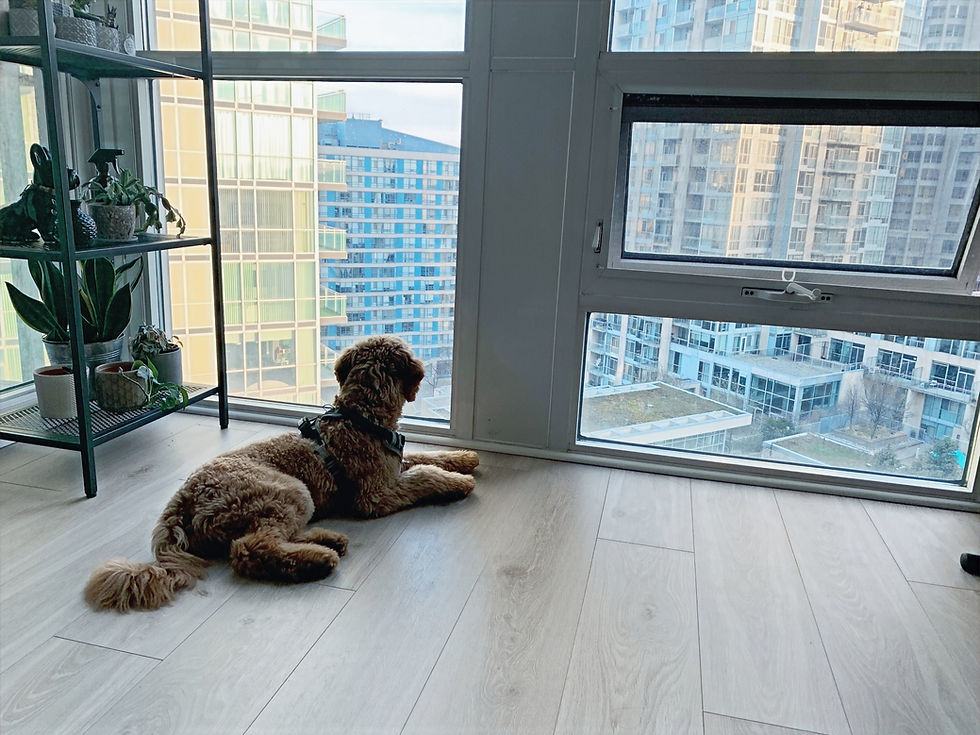Dog Barking: What Is My Dog Saying? 🤔
- Carlos C.
- Feb 16, 2024
- 4 min read
Dog Barking: What Is My Dog Saying? 🤔
Growing up I often heard the saying, in Spanish, "Dog that barks, doesn't bite." And through the years, as a dog trainer, I've found that to be quite true. The key takeaway from that saying for me was not that a dog who barks will never bite, but rather that if a dog is barking, you are less likely to get bitten because the bark is acting as a form of communication, and in many cases, a warning.

But that's mostly useful to keep in mind when dealing with a dog you don't know. But what about our own dogs at home? What are they saying when they're barking around us, or perhaps right at us?
Here's a quick list of what your dog could be saying and why:
1. Boredom/Pent-up energy: If you know me well, you probably saw this one coming a mile away. Being as big on enrichment as I am, I am no stranger to homes where a key reason behind their dog's barking is they have little to no outlets to their energy. Sometimes barking itself is an activity that dogs either enjoy or need to do, so providing them with environments where they can do that can be part of their enrichment as well. The good news is that this motive for barking is very much preventable if you are consistent and creative with your dog's daily/ enrichment routine.
2. Expressing concern/Wanting space: Think of the mailman or the person who drops off your Amazon package at your door. You have an idea of when they're coming, why and how long they'll be there. Those are important details that your dog doesn't have or understand the same way we do, and so it becomes normal for them to bark when they hear someone outside to express concern as well as to alert you, and the person outside too. If you heard someone at your front door that you didn't expect, you might not say something right away, but you'll probably do something about it to get more information, before actually worrying. This is something that's a bit tougher for dogs to do before feeling concerned, but not only that, we've actually raised and bred dogs through hundreds (and even thousands) of years, to act as a reliable alarm system. But if you have a dog at home that gets concerned when they hear something outside your door, try this. And if their concern happens to be outdoors, help them take space, take a break and reset from the environment or individual (dog, human or object) that worries them.
3. Excitement/Overstimulation: Just like an overly excited toddler OR an overly tired toddler, both mindsets can cause your dog to bark. It can also contain a mixture of the first two points, especially when a dog doesn't have a lot of access to thinking skills development and calming activities. But even the most experienced and most trained dogs have a limit, and many will use barking as a way to let you know that they've reached it. A quick solution at that moment is to change their scenery, as it can allow their brain to take a much-needed break and reboot. And if you'd like to help your dog become skilled, in the arts of regulating their excitement and other emotions, I highly recommend this exercise.
4. Frustration: This one is pretty synonymous with the last point, but worth mentioning because there can be instances where the best thing you can do to respond is to wait. An example situation would be if your dog is trying to figure out a food puzzle, but they can't quite crack it and so they start barking. Either right at it or at you. This can be an opportunity for you to let your dog figure out the puzzle on their own by trying something else, OR, this can be an opportunity for you to let your dog figure out that you will help them only if/when they're not asking for your help by barking. And so it's important that you pay attention to the barking, as an indicator of your dog's limits, but also what tends to lead to it, so that you can either assist or redirect them, before they reach that point of frustration and bark. Remember that with barking, just like with any other behaviour your dog does, there's always a reason or motive behind it and it's important to take a moment to think of what that reason might be. It may not be listed here, or it may be an amalgamation of the points above and more. But the important idea to note is that it's an opportunity for our dogs to feel heard, and for us to show them that we hear them before they even feel the need to bark. Because the more you can tend to a need before an unwanted behaviour starts to form, the more you remove the need for that behaviour to become a habit in the first place.
